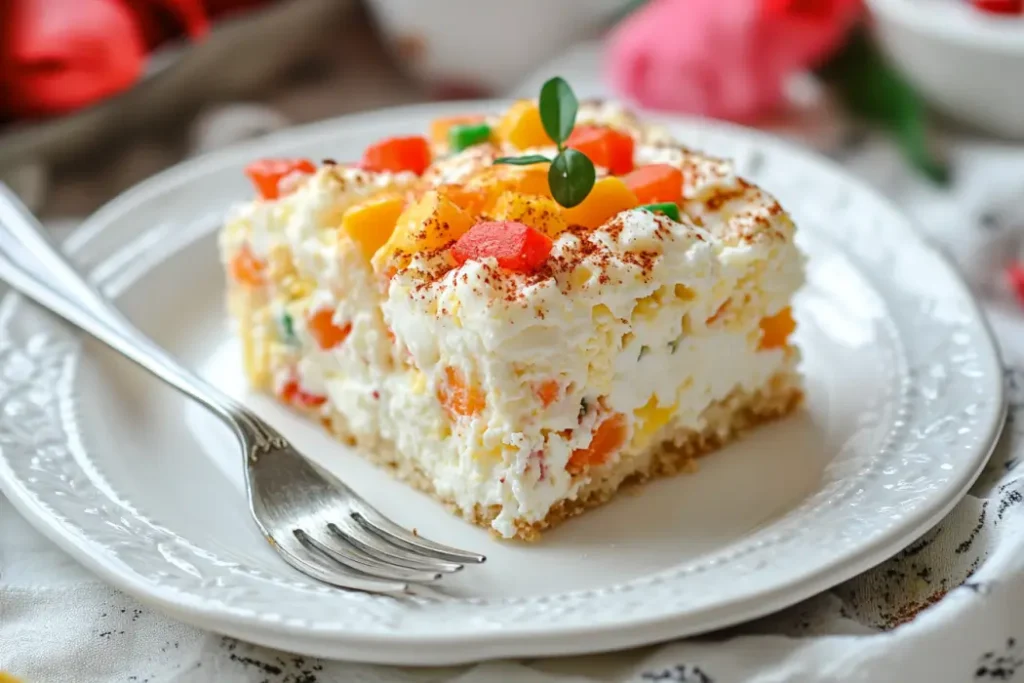
Have you ever wondered why people are mixing cottage cheese with eggs? This combination may seem unusual at first, but it’s becoming a popular trend among food lovers, chefs, and health enthusiasts. Whether you’re aiming for fluffier scrambled eggs, a richer flavor, or an added nutritional punch, cottage cheese has a surprising way of elevating this breakfast classic.
In this article, we’ll explore the science, benefits, and delicious ways to combine cottage cheese and eggs. By the end, you’ll be inspired to try this simple yet game-changing breakfast hack.
What Is Cottage Cheese?
Cottage cheese is a fresh cheese made by curdling milk and separating the curds from the whey. Unlike aged cheeses like cheddar or gouda, cottage cheese has a mild, slightly tangy flavor and a creamy, lumpy texture. It’s often sold in small, medium, or large curd varieties, making it versatile for various dishes.
A Brief History of Cottage Cheese
Cottage cheese has been around for centuries, with its origins dating back to ancient times when people first started preserving milk. The name “cottage cheese” comes from its humble beginnings—this cheese was often made in cottages using leftover milk. Over time, it gained popularity due to its simplicity and nutritional value.
Common Uses in Cooking
Cottage cheese is beloved for its ability to adapt to both savory and sweet dishes. From blending into smoothies to topping salads or stuffing lasagna, it’s a staple ingredient in many kitchens. But perhaps one of its most unique uses is mixing it with eggs, creating a creamy and protein-packed dish.
Why Do People Add Cottage Cheese to Eggs?
Adding cottage cheese to eggs isn’t just a trendy idea—it’s a culinary trick that works wonders for taste, texture, and nutrition.
A Nutritional Boost
Cottage cheese is high in protein, low in calories, and packed with essential nutrients like calcium and B vitamins. When added to eggs, it enhances the meal’s overall protein content, making it ideal for anyone looking to stay full longer, build muscle, or maintain a balanced diet.
Enhanced Flavor
The mild, creamy tang of cottage cheese pairs beautifully with the richness of eggs. It mellows out the eggy flavor, making the dish more appealing for those who might not be big fans of plain scrambled eggs.
Improved Texture
One of the standout reasons people love this combo is the incredible texture it creates. Cottage cheese adds moisture and creaminess, resulting in scrambled eggs that are fluffy and tender rather than dry or rubbery.
Nutritional Benefits of Adding Cottage Cheese to Eggs
Combining cottage cheese with eggs isn’t just a culinary trick—it’s a nutritional powerhouse. This simple pairing creates a meal that’s rich in essential nutrients, making it a great choice for a healthy lifestyle.
High in Protein
Eggs and cottage cheese are both excellent sources of protein. Eggs provide about 6 grams of high-quality protein each, while a half-cup of cottage cheese contains around 14 grams. When combined, these two ingredients offer a substantial protein boost, which is ideal for muscle repair, growth, and keeping you energized throughout the day.
Packed with Vitamins and Minerals
Both ingredients are loaded with essential nutrients:
- Eggs are a great source of vitamins A, D, E, and B12, along with minerals like selenium and choline, which are essential for brain health.
- Cottage cheese adds calcium for strong bones, potassium for muscle function, and phosphorus for energy production.
Together, they provide a well-rounded nutrient profile that supports overall health.
Low in Calories, High in Satiety
One of the best things about adding cottage cheese to eggs is how satisfying the meal is without being calorie-dense. Cottage cheese is low in fat and calories, while the eggs’ protein content promotes a feeling of fullness. This makes the dish perfect for those managing their weight or looking to avoid unhealthy snacking between meals.
How Cottage Cheese Changes the Texture of Eggs
Have you ever struggled to make perfectly fluffy scrambled eggs? Cottage cheese can be your secret weapon. Here’s how it transforms the texture of eggs.
Creates a Creamier Consistency
When mixed into eggs, cottage cheese melts slightly as it cooks, releasing moisture that prevents the eggs from drying out. The result is a creamy, velvety texture that’s hard to achieve with eggs alone.
Fluffy Scrambled Eggs
The curds in cottage cheese introduce air pockets into the egg mixture as it cooks, making the scrambled eggs puffier and more tender. It’s like giving your eggs a natural upgrade without needing heavy cream or butter.
A Unique Cooking Chemistry
Cottage cheese contains a mix of proteins and fat that interacts with the proteins in eggs during cooking. This interaction helps stabilize the eggs, so they don’t overcook as quickly, reducing the risk of rubbery or chewy scrambled eggs.
How to Use Cottage Cheese in Eggs
Adding cottage cheese to eggs is surprisingly simple, and it doesn’t require any special skills. Here’s a step-by-step guide to getting it just right, along with tips to customize your dish.
Mixing Methods
The way you combine cottage cheese with eggs can impact the final texture and taste:
- Whisk Together: For evenly creamy eggs, whisk the cottage cheese directly into the beaten eggs before cooking.
- Layer It: Prefer texture? Add the cottage cheese after the eggs have partially set in the pan for visible curds in every bite.
- Blend for Smoothness: If you’re not a fan of the lumpy texture, blend the cottage cheese into a smooth paste before mixing it with the eggs.
Proportions for Success
The ideal ratio depends on your personal taste:
- For a subtle effect, use 2 tablespoons of cottage cheese per egg.
- For a creamier, protein-packed dish, go for ¼ cup of cottage cheese per 2 eggs.
Experiment with these proportions to find the balance that works for you.
Cooking Tips for Beginners
- Low and Slow: Cook your eggs on medium-low heat to prevent overcooking and to let the cottage cheese fully integrate.
- Non-Stick Pan: Use a non-stick skillet to avoid sticking and make cleanup easier.
- Season After Cooking: Add salt and seasonings after the eggs are cooked to avoid drawing out moisture too early.
Different Recipes Using Cottage Cheese and Eggs
Once you’ve mastered the basics, it’s time to experiment with recipes. Here are some ideas to inspire your next meal:
Cottage Cheese Scrambled Eggs
The classic recipe is a simple mix of eggs and cottage cheese, cooked slowly for a fluffy texture. Add a pinch of salt, pepper, and fresh herbs like chives or parsley for extra flavor.
Cottage Cheese Egg Bake
Looking for a make-ahead breakfast? Combine eggs, cottage cheese, spinach, and diced vegetables in a baking dish. Bake at 350°F (175°C) for 30 minutes until set. It’s perfect for meal prep and can be sliced into portions.
Cottage Cheese Omelets
Make a creamy omelet by folding whipped cottage cheese and your favorite fillings—like sautéed mushrooms and spinach—into the center before folding the omelet closed. This adds a gourmet touch to a simple dish.

Health Benefits of Eating Eggs with Cottage Cheese
In addition to their nutritional value, eggs with cottage cheese provide several unique health benefits:
Weight Management
The high protein content helps control hunger, reducing the urge to snack on unhealthy foods. It’s a smart choice for anyone looking to maintain or lose weight.
Muscle Building
The amino acids in both eggs and cottage cheese are essential for muscle repair and growth, making this combination popular among athletes and fitness enthusiasts.
Heart Health
Eggs are rich in healthy fats, and cottage cheese contains potassium, which supports heart health. Together, they create a balanced meal that promotes cardiovascular wellness.
Variations and Twists to Try
The beauty of combining cottage cheese and eggs lies in its versatility. Here are some ways to mix things up:
Add Vegetables
Incorporate chopped spinach, bell peppers, or onions into the mixture for added color, flavor, and nutrients. These vegetables not only boost the dish’s health benefits but also make it visually appealing.
Experiment with Different Cheeses
While cottage cheese is the star, you can blend it with other cheeses like mozzarella, Parmesan, or cheddar for a richer flavor profile.
Play with Seasonings
Take your dish to the next level with spices and herbs:
- For a Mediterranean vibe, add oregano, thyme, and sun-dried tomatoes.
- For a spicy kick, sprinkle in chili flakes, paprika, or cumin.

Common Mistakes When Combining Cottage Cheese and Eggs
Avoiding a few common errors will ensure your cottage cheese and egg dishes turn out perfectly every time.
Overcooking the Eggs
Eggs cook quickly, and overcooking can make them rubbery. Cook over medium-low heat and stir gently to prevent this.
Using the Wrong Proportion
Too much cottage cheese can overwhelm the eggs, making the dish watery. Start with small amounts and adjust to taste.
Choosing the Wrong Cottage Cheese
Avoid using dry or overly watery cottage cheese. Opt for a creamy, medium-curd variety for the best texture.
Expert Opinions and Testimonials
What Chefs Say
Professional chefs love this pairing for its versatility and simplicity. Many recommend adding it to breakfast menus for a unique twist on classic scrambled eggs.
Insights from Nutritionists
Nutritionists often highlight the high protein and nutrient density of eggs and cottage cheese, making it a recommended meal for those focused on healthy eating.
Stories from Home Cooks
Many home cooks rave about this combination, describing it as a game-changer for breakfasts. “I never thought scrambled eggs could taste this good,” says one enthusiast, while others praise its ease and quick preparation.
Frequently Asked Questions (FAQs)
Can You Taste the Cottage Cheese in Eggs?
Not really! When mixed and cooked, the cottage cheese blends into the eggs, adding creaminess without an overpowering tang. For those who dislike the texture, blending the cottage cheese beforehand eliminates the curds entirely. Want to try a recipe? Check out our Cottage Cheese Egg Bake: Healthy Protein-Packed Recipe.
Is This Recipe Good for Keto Diets?
Yes! Both eggs and cottage cheese are low in carbs and high in healthy fats, making them ideal for a ketogenic lifestyle. Just ensure you use full-fat cottage cheese for optimal results. For more ideas, explore our Outline for Cottage Cheese Breakfast Recipes.
How Long Can You Store Leftovers?
Leftover cottage cheese and egg dishes can be stored in an airtight container in the refrigerator for up to 3 days. Reheat gently on low heat to maintain the texture.
What Type of Cottage Cheese Works Best?
A medium-curd, creamy cottage cheese is ideal for mixing with eggs. Avoid dry or overly watery varieties, as they may affect the dish’s consistency.
Can Vegan Alternatives Be Used?
Yes! You can substitute eggs with vegan egg replacements (like tofu or chickpea flour mixtures) and use dairy-free cottage cheese alternatives. These options work well for those following plant-based diets. For more plant-based breakfast inspiration, visit The Perfect Bagel with Cream Cheese and Tomato.
What Happens if You Overcook the Mixture?
Overcooking can make the eggs rubbery and the cottage cheese release too much water, leading to a soggy texture. Stick to medium-low heat and remove the eggs from the pan as soon as they’re just set. For additional cooking tips, read Why Put Ketchup in Meatloaf?.
Conclusion
Adding cottage cheese to eggs is a simple yet transformative way to elevate a classic dish. From its creamy texture and enhanced flavor to the impressive nutritional benefits, this pairing is worth trying for anyone looking to mix up their breakfast routine. Whether you’re a beginner in the kitchen or a seasoned chef, this hack is easy to master and endlessly versatile. So, grab some cottage cheese, crack a few eggs, and start experimenting today. Your taste buds—and your body—will thank you!
